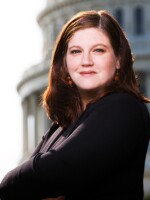In Shakespeare's epic tale, Juliet asks, "What's in a name? That which we call a rose / By any other name would smell as sweet."
My question is, does it work the other way around? Does a fuzzy name make fish smell less ... fishy?
This election season, the TV airwaves are saturated in many places, with nasty, snarling attack ads.
Some of the ads come from recognizable sources -- like the Republican Governors Association and the Democratic Senatorial Campaign Committee. But the vast majority come from private, often newly formed nonprofit groups that, by law, don't have to tell anyone where their funding comes from.
Groups like "Americans for Job Security," "Crossroads Grassroots Political Strategies" and "The Commission on Hope, Growth and Opportunity" -- or, as I like to call it, "The Commission on Butterflies, Rainbows and Unicorns."
The point is, do voters -- who seem to almost universally hate attack ads -- like them any better when they're sponsored by these happy, innocuously named organizations?
And does it matter to voters that it is these very groups that create a wide-open path for vast amounts of secret corporate money to flow into politics?
It's a situation that was created in large part by the Supreme Court decision last winter called Citizens United v. Federal Election Commission. The court ruled that corporations, like people, have free speech rights and can't be barred from spending money on politics.
All those groups with fuzzy names allow corporations to do that without having to tell anyone how much they're spending or on which campaigns. That protects businesses from potentially annoying half their clients or patrons, who may not hold the same political views -- and from appearing to buy representation in Congress.
Thing is, here in the NPR newsroom, we can't figure out what to call these groups. They're not affiliated with candidates or the parties. They're certainly not nonpartisan or nonpolitical. Calling them "special interests" sounds pejorative, and "independent groups" sounds meliorative.
So we put the question to you. What should we call these groups? And don't be snarky -- we need your help. Send your ideas through Facebook or Twitter, @nprweekend.
Or below, in the comments section. Next week, we'll read some of your thoughts.
Copyright 2022 NPR. To see more, visit https://www.npr.org. 9(MDAzMjM2NDYzMDEyMzc1Njk5NjAxNzY3OQ001))






